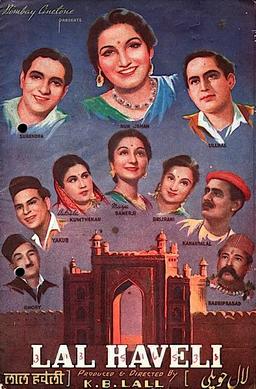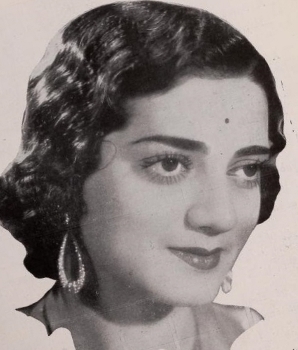Related Research Articles
Motilal Rajvansh was an Indian actor and the winner of Filmfare Best Supporting Actor Award for Devdas (1955) and Parakh (1960). He is credited with being among Hindi cinema's first natural actors.

Om Prakash Chibber was an Indian film actor. He was born in Jammu and was a well known character actor of Hindi Cinema. His most well-known movies are Gopi (1970), Hulchul (1971), Namak Halaal (1982), and Sharaabi (1984).
Om Prakash Bhandari, better known as Qamar Jalalabadi, was an Indian poet and lyricist of songs for Hindi movies. He composed the title track of the popular television serial Vikram Aur Betaal.

Khemchand Prakash was a music composer in the Hindi film industry. He had few peers in 1940s, the decade for Indian film music which started with Saigal very active on the scene and ended with Lata Mangeshkar firmly established in the industry. Lata had fruitful association with him when she started making a name for herself.

The following is a filmography for the Indian film actor, singer, lyricist, composer, producer, director, screenwriter and scriptwriter Kishore Kumar :

Bhanwara is an Indian Hindi language film. It was the third highest grossing Indian film of 1944. It was released in 1944. The film was directed by Kidar Sharma for Ranjit Movietone. It starred K. L. Saigal, Arun, Kamala Chatterjee, Monica Desai, Lala Yakub and Brijmala.

Lal Haveli is a Bollywood film. It was released on 15 December 1944. The film was directed by K. B. Lall, for whom it was a debut directorial venture. Lall had started his career playing a villain in Sohrab Modi's Bharosa (1940), and as a "storywriter" with the V. C. Desai directed film Radhika (1941), finally producing Savera (1942) directed by V. C. Desai, before turning his hand at direction with Lal Haveli.
Ek Hi Raasta is a 1939 Hindi social film directed by Mehboob Khan. The director of photography was Faredoon Irani with story by Babubhai A. Mehta and Wajahat Mirza. The film was produced by Sagar Movietone. The cast included Arun Kumar Ahuja, Sheikh Mukhtar, Anuradha, Kanhaiyalal and Harish. This was the debut film of Sheikh Mukhtar, who went on to act in and direct several successful films, and Arun Kumar Ahuja, a prominent actor in the 1940s. Ek Hi Raasta is a film about wrongs of society and its laws. It was one of the early Hindi films to make a noticeable application of WW II.
Sarvottam Badami (1910–2005) was an Indian film director of Hindi, Telugu, and Tamil films. He started his career as a sound recordist for the first talkie in India, Alam Ara (1931). In 1948 he helped set up the Films Division for news-reel and documentaries, where he worked as the chief producer in the newsreel department and also made documentaries. His active years were from 1932 to 1952 when he retired from the Films Division and from making feature films to settle in Bangalore.
Sajani is a 1940 Hindi social film directed by Sarvottam Badami for Sudama Productions. Scripted by Zia Sarhadi, the film had music by Gyan Dutt and starred Prithviraj Kapoor, Sabita Devi, Snehprabha Pradhan, Noor Jehan, Dixit, and Ghory. Badami left Sagar Movietone where he had made satirical comedies to join his "mentor" Ambalal Patel at Sudama Productions to make "socially relevant film(s)", where Sajani was one of the first. Snehprabha Pradhan acted in several films produced by Chimanbhai Desai in 1940, including Sajani.
Khilona is a 1942 social Hindi film directed by Sarvottam Badami. The film was produced at Ranjit Studios by Amar Pictures. It had music by Khemchand Prakash with lyrics by Pandit Indra Chandra. Khilona was one of the major films which brought the actress Snehprabha Pradhan into prominence. The cast included Snehprabha Pradhan, P. Jairaj, Prabha, Satish, Kanhaiyalal and Pratima Devi.

Do Diwane also known as Be Kharab Jan, is a 1936 Hindi/Gujarati comedy film directed by Chimanlal Luhar based on K. M. Munshi's famous play Be Kharab Jan. The film was produced by Sagar Movietone and had music composed by Pransukh Nayak with cinematography by Keki Mistry. The cast included Shobhana Samarth, Motilal, Yakub, Aruna Devi, Rama Devi, Kamalabai, Kayam Ali, Pande and Pesi Patel.

Samaj Ko Badal Dalo is a 1947 Indian Hindi social melodrama film directed by Vijay Bhatt. Produced under the Prakash Pictures banner, its music composer was Khemchand Prakash, with lyrics by Pandit Indra, Roopdas, and Qamar Jalalabadi. The story, screenplay and dialogues were by Pandit Girish. Its cinematographer was Yusuf Mulji and the film starred Arun Ahuja, Mridula, Yakub, Leela Pawar, Umakant and Bikram Kapoor.
Dina Nath Madhok was a prominent lyricist of Bollywood in the 1940s to 1960s. He started his career with the 1932 film Radhey Sham. He wrote over 800 songs in his career spanning four decades and was regarded as one of the top lyricist in the 1940s earning himself the soubriquet "Mahakavi Madhok". Madhok is cited as one of the three "First Generation" of lyricists along with Kidar Sharma and Kavi Pradeep. Apart from writing lyrics, he wrote screenplays and directed films. He directed almost 17 films like Baghdad Ka Chor (1934), Mirza Sahiban (1939), Biwamangal (1954) and the Madhubala-starrer Naata (1955).

Ladki Sahyadri Ki is a 1966 Hindi social drama film directed by V. Shantaram. Also called Iye Marathichiye Nagari in Marathi, it was a bilingual for V. Shantaram productions under the Rajkamal Kalamandir banner. The music was composed by Vasant Desai, with lyrics by Bharat Vyas. The cast included Sandhya, Shalini Abhyankar, Vatsala Deshmukh, Kumar Dighe, Keshavrao Date, and Baburao Pendharkar.

Holi is a 1940 Hindi/Urdu social drama film directed by A. R. Kardar. Holi was produced by Ranjit Movietone and had music composed by Khemchand Prakash with lyrics by D. N. Madhok. It had Khursheed and Motilal starring in the lead with Sitara Devi, Ishwarlal, Keshavrao Date, Dixit, Ghory and Manohar Kapoor.
Abhagin is a 1938 Hindi film directed by Prafulla Roy for New Theatres Ltd., Calcutta. A bilingual, it was made in Bengali language as Abhigyan. The film was based on a story by Upendranath Ganguly, with dialogues by A. H. Shore. R. C. Boral provided the music composition with lyrics for the Hindi version by Munshi Arzu, and by Ajoy Bhattacharya for the Bengali. The screenplay was by Phani Majumdar for whom it was his first independent film as a scriptwriter. Bimal Roy, who was to make a name for himself as a prominent Bengali and Hindi director, was the cinematographer for the film. The cast included Molina Devi, Prithviraj Kapoor, Vijay Kumar, Nemo and Bikram Kapoor.

Sabita Devi (1914–1965) was a Hindi film actress in Indian cinema. She is stated to be one of the "prominent" leading ladies of the "pioneering era" of Indian cinema along with Mehtab, Bibbo, Durga Khote, Gohar, Devika Rani and Seeta Devi. A Jewish by birth, she changed her name to find acceptability in Hindi cinema like the other Anglo-Indian and Jewish actresses of her time, Sulochana, Seeta Devi, Madhuri, and Manorama. After initially working with British Dominion Films Ltd., Calcutta, she shifted to Bombay and performed mainly in films produced by Sagar Movietone with her co-star in most films being Motilal. Some of the popular films with Motilal were Dr. Madhurika (1935) and Kulvadhu (1937) directed by Sarvottam Badami. Their first film together was Shaher Ka Jadoo (1934), which was also Motilal's debut film, and then Lagna Bandhan (1936) both directed by Kaliprasad Ghosh. She acted in Silver King (1935) with Motilal. It was an action film directed by C. M. Luhar, which became a "huge success".

Sagar Movietone also Sagar Films, Sagar Film Company and Sagar Productions was an Indian film production company involved in the making of films for Indian cinema. It was launched by Ardeshir Irani with Chimanlal Desai and Dr. Ambalal Patel in 1929 in Bombay, Maharashtra, India. Sagar was initially started as a branch company of Ardeshir's Imperial Film Company. Several key figures from Imperial, such as Mehboob Khan were shifted to Sagar. The studio was in operation from 1930 to 1939. In 1940, it combined with General Pictures to form National Studios. It made "Parsi theatre based films, mythologicals and stunt movies". Sagar fostered the career of many artists who rose to prominence. Early directors such as Prafulla Ghosh, Sarvottam Badami, Ezra Mir and Nanubhai Vakil were promoted by the company. Mehboob Khan got his first break as a director in Al Hilal in 1935. He was referred to as "the most important alumnus" from Sagar, who went on to become one of Indian cinema's "most influential film-makers".
References
- ↑ "Holiday in Bombay". Gomolo.com. Retrieved 23 July 2012.
- ↑ Ashish Rajadhyaksha; Paul Willemen; Professor of Critical Studies Paul Willemen (2014). Encyclopedia of Indian Cinema. Routledge. p. 50. ISBN 978-1-135-94318-9.
- ↑ "Holiday in Bombay 1941". Hindi Geetmala. Retrieved 4 October 2014.
- ↑ "Holiday in Bombay". Alan Goble. Retrieved 4 October 2014.
- ↑ "Holiday in Bombay". MySwar. Retrieved 4 October 2014.